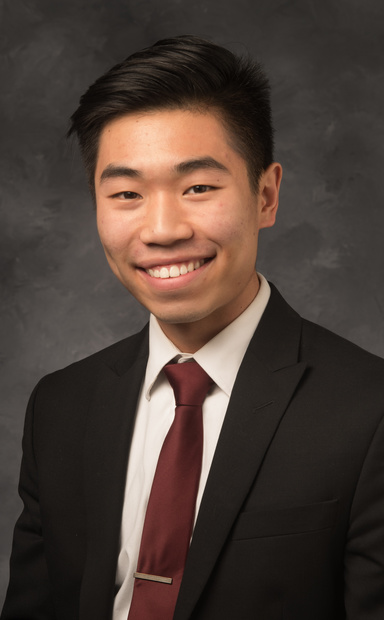Guowei Qi, a fourth-year student from West Des Moines, Iowa, has been named one of 17 Churchill scholars in the nation.

Qi will graduate in May with degrees in biochemistry, computer science, and mathematics and is the fifth University of Iowa student to receive the fellowship. The award wouldn’t have been possible, Qi says, without mentors like Michael Schnieders, associate professor of biochemistry and biomedical engineering.
As part of Schnieders’ research group in the College of Engineering, Qi uses theoretical biophysics and computer algorithms to represent the interactions of water molecules and simulate the folding of proteins. Protein folding is a cellular process during which proteins are correctly folded into specific, three-dimensional shapes in order to function correctly. If proteins remain unfolded or are misfolded, they contribute to the pathology of many diseases.
By mathematically modeling the underlying chemistry of proteins, Qi finds ways to efficiently observe the structure and function of biomolecules.
“In the past, most biochemistry and pharmacology research was conducted using purely wet lab experimental methods such as X-ray crystallography, nuclear magnetic resonance, or electron microscopy,” says Schnieders. “We’ve reached a point where complementary computational methods are helping us do more, faster.”
Qi says he was drawn to Iowa because of research opportunities for undergraduates in the biomedical sciences.
Kris DeMali, professor and departmental executive officer of biochemistry in the Carver College of Medicine, says she was thrilled to hear of Qi’s award.
University of Iowa Churchill Scholars
- 2021: Guowei Qi, biochemistry, computer science, and mathematics
- 2012: Suzanne Carter Squires, mathematics and physics
- 2012: Colorado Reed, applied physics
- 2010: Maria Drout, astronomy and physics
- 2007: James Ankrum, biomedical engineering
“As a department, we prioritize the development of undergraduates because it fosters careers in scientific research and helps them clarify their goals while they develop critical thinking and technical abilities and hone their communication skills,” says DeMali.
Schnieders offered his own perspective on Qi’s success, touting his communication and drive.
“Conducting collaborative computational research requires a lot of active communication and self-direction,” Schnieders says. “Guowei’s comfort with both strengthened the work of his graduate student mentors Mallory Tollefson and Rae Corrigan, as well as his own projects.”
As a 2019 Goldwater Scholar and recipient of early funding through the Iowa Center for Research by Undergraduates (ICRU), Qi is a strong advocate for expanding access and support for these kinds of critical training experiences.
“Working with Mike and his group has really shaped what I’ve done at Iowa as well as what I will do next,” says Qi. “He has never hesitated to help me connect with new questions on campus and off. Everyone deserves the kind of mentorship I’ve experienced at Iowa.”
Tanya Uden-Holman, associate provost for undergraduate education and the dean of University College agrees with Qi.
“Our faculty and staff offer students a chance to practice scientific and technical skills inside of relationships, to know that there will be both challenge and support available to them if they are willing to go after big opportunities,” Uden-Holman says.
Qi will continue his work in the University of Cambridge’s Yusuf Hamied Department of Chemistry while completing a 12-month research-focused degree.
“My focus is computational biophysics and at Cambridge, I’ll be working with Professor David Wales, one of the world’s leading researchers in the area to explore the functions and malfunctions of proteins using computational analysis,” Qi says.
Qi says he is excited to study at Cambridge and that the scholarship application process required him “to think more about myself than I ever have in my life.”
“After 20 drafts, when I finally hit submit, I really understood why I want to conduct computational biophysics research,” Qi says. “Being able to so as a Churchill scholar is an incredible honor.”
The Churchill Scholarship was established in 1963 by Sir Winston Churchill to help strengthen the scientific and technological partnership between the U.S. and the United Kingdom. The award covers the cost for one year of study at Churchill College in the University of Cambridge, including full tuition, a stipend, travel costs, and the chance to apply for a $2,000 research grant.